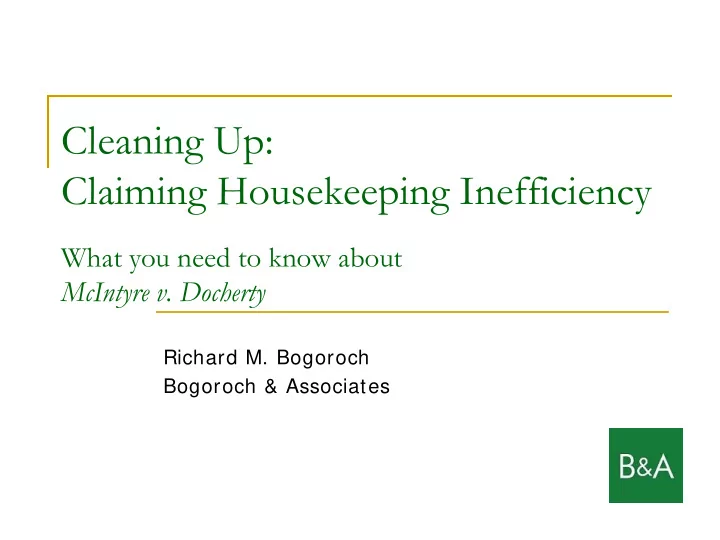

Cleaning Up: Claiming Housekeeping Inefficiency What you need to know about McIntyre v. Docherty Richard M. Bogoroch Bogoroch & Associates
Background of McIntyre v. Docherty MVA: April 23, 2000 Injuries: Chronic pain Fibromyalgia Depression Anxiety Could perform most housekeeping with pain Remainder of housekeeping performed by family members
Jury Award For housekeeping claim, jury awarded: $5,000 for past housekeeping insufficiency damages; $10,400 for past loss of housekeeping capacity; and, $44,535 for loss of future housekeeping capacity $92,500 non-pecuniary general damages
Basis of Defendant Appeal Housekeeping insufficiency is not a separate head of damage; Should be included as part of non-pecuniary damages for pain and suffering No incurred expenses, therefore no entitlement to past and future loss of housekeeping capacity
Court of Appeal Trial judge’s award upheld.
Impact What guidance does offer for McIntyre other housekeeping claims? sets out factors relevant in establishing claims for housekeeping; sets out three instances of loss of housekeeping capacity; guidance regarding quantification
Establishing Housekeeping Claims Relevant factors: pain and suffering when performing housekeeping tasks; previous high housekeeping standards; impact of injuries on standards; inability to do tasks previously enjoyed; and impact on relationships with others
Types of Housekeeping Losses Work left undone; Work done with increased pain and decreased efficiency; Work done by Third Parties
Work Left Undone Unable to perform housekeeping; and Third party does not complete housekeeping tasks Where work is undone, two compensable non-pecuniary losses personal loss to plaintiff: housekeeping contributes to person’s self-worth and identity; loss of amenity: forced to live with loss of amenity of orderly and functioning home
Work Done with Difficulty Continues to perform housekeeping activities, but experiences pain or difficulty “Inefficiency” occurs when: “He or she is required to work more hours post-accident to accomplish the same amount of pre-accident housekeeping. If a plaintiff thus works “inefficiently” her or his non- pecuniary award would be increased to reflect any increased pain and suffering. To the extent the plaintiff’s inefficiency also results in a less clean and organized household, this is a loss of an amenity that the award for non-pecuniary damages would also take into account.” Court considers: evidence of pre-accident and pre-trial housekeeping, increased pain and suffering, decreased housekeeping, impact of reduction in standard of housekeeping on plaintiff.
Work Done by Third Parties Incurs out-of-pocket expenses by hiring housekeeper: may claim replacement costs
Calculating Housekeeping Claims Three main points: where pecuniary and non-pecuniary award made, no need to separate or item ize sub- categories for different com ponents under global aw ard for non-pecuniary dam ages award for housekeeping inefficiency dam ages should not be deducted from aw ard for past loss of housekeeping not required to incur out of pocket expenses for housekeepers to be successful in claim ing aw ard of housekeeping
Proving Housekeeping Claims Quantification of economic loss requires assistance of experts Economist should be retained to prepare report and give evidence regarding housekeeping claims
Conclusion Both non-pecuniary and pecuniary awards possible in housekeeping claims Non-pecuniary: work left undone work done with difficulty Pecuniary: replacement value of work done by third party Two types of non-pecuniary losses: loss of identity associated with work performed loss of amenity of orderly and functioning home
Recommend
More recommend